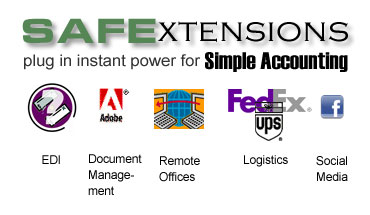 Each transaction is identified and accessed by a Vendor ID, Vendor Invoice and Transaction ID. You can assign the invoice to a particular department and to a job number which can be used to match all parts of a job from other Simple Accounting modules for reporting purposes.
Each transaction is identified and accessed by a Vendor ID, Vendor Invoice and Transaction ID. You can assign the invoice to a particular department and to a job number which can be used to match all parts of a job from other Simple Accounting modules for reporting purposes.
Confirming The Transaction
When you are done entering items, press [OK] to save the transaction. Once the transaction has been saved you may tag it for payment and pay it.
Header Fields
|
VENDOR ID |
Enter the Vendor ID here. Use the field lookup button to lookup vendors. If this is not a regular vendor which you have entered into FILES|Vendors, enter “CASH” as the Vendor ID and type the name and address in the ADDRESS tab. This creates a One-Time Vendor.
|
|
INVOICE |
You must enter an invoice number which is unique for this vendor. Entries posted from customer invoices will be filled in except for this field or leave the field blank. The Vendor Invoice is not
|
|
INVOICE DATE |
Enter the invoice date.
|
|
TERMS ID |
The payment terms for this transaction. The default is the Terms ID entered for this vendor under FILES|Vendors.
|
|
DUE DATE |
If the selected TERMS ID has the User-Defined box checked, then this field will be enabled, allowing the user to enter their own Due Date. Otherwise, this field consists of the INVOICE DATE plus the NUMBER OF DAYS TO PAY selected with the Terms ID.
|
|
A/P ACCOUNT # |
Enter the Accounts Payable G/L account number here. The default value is the DEFAULT A/P ACCOUNT field you specify in Setup Global Options. Most businesses will stick with the default. However, this field allows you to maintain separate A/P journals for different parts of your business, if necessary.
|
|
EMPLOYEE ID |
Enter the employee responsible for this expense. You may wish to set up a HOUSE ID to cover expenses not applicable to any one employee.
|
|
REFERENCE # |
This is a user defined field. Use this field to track jobs across multiple invoices, or between customer invoices and AP. The job # from sales orders is entered automatically for you if this is an entry posted over from a customer invoice. The job number is posted to G/L entries to allow you to track job costs in that module.
|
|
|
This field will contain the sales order ID for any Vendor Bill automatically generated when a Sales Order was invoiced. This not only allows you to cross-reference automatic sales invoices to allow you to cross-reference sales and their costs. You can also add additional costs to a sales order, simply by adding or changing a Vendor Invoice which has the Sales Order ID to which you wish to link! Even if new bills come in after you invoiced your customer, these costs will correctly update the profitability of the sales order!
|
|
This field will contain the purchase order number for any Vendor Bill automatically generated with a purchase order, either when an Distributor Purchase Order was received or completed in the Vendor P.O.s browse or when a sales order was invoiced.
|
|
|
INVOICE NOTES TAB |
Enter any special comments or notes about this invoice for future reference here.
|
|
ADDRESS TAB
|
If this is one of your regular Vendors, the address information appears here as entered in the Vendor Master. In that case, these fields will all be read only. This is a good double-check for making sure you’ve selected the correct vendor. If this is a One Time Vendor, you must enter the Vendors Name and Address here. One Time Vendors can be converted to a regular Vendor under the Name tab of the Bills Browse.
|
Entering Line Items
Once you have completed the header, you will need to enter line items to allocate your costs to. The total amounts entered into these line items will determine the TOTAL of the vendor invoice. Once you have finished adding your line item(s), you should check the Invoice Total and then press [OK] to save the transaction.




 This button activates a [tooltip slug="browse-box"]browse box[/tooltip]. It is always placed directly to the right of an entry field and allows you to select a value for the entry field from the browse box. The browse box usually has all the same functions as if you had selected it from the main menu, so you can add, edit or delete records in the browse without leaving your original task.
This button activates a [tooltip slug="browse-box"]browse box[/tooltip]. It is always placed directly to the right of an entry field and allows you to select a value for the entry field from the browse box. The browse box usually has all the same functions as if you had selected it from the main menu, so you can add, edit or delete records in the browse without leaving your original task. Pressing <F6> on your keyboard when you are in a field with a lookup button works the same as pressing the Field Lookup button itself!
Pressing <F6> on your keyboard when you are in a field with a lookup button works the same as pressing the Field Lookup button itself!